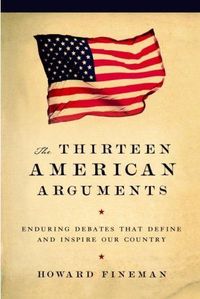

Purchase
The Thirteen American Arguments
Howard Fineman
Enduring Debates That Define and Inspire Our Country
Random House
May 2008
On Sale: April 22, 2008
320 pages
ISBN: 1400065445
EAN: 9781400065448
Hardcover
Add to Wish List
Non-Fiction
Howard Fineman is one of our best-known and most trusted
political journalists. Mixing vivid scenes and figures from
the campaign trail with forays into four hundred years of
American history, Fineman shows that every debate, from our
nation’s founding to the present day, is rooted in one of
thirteen arguments that–thankfully–defy resolution. It is
the very process of never-ending argument, Fineman explains,
that defines us, inspires us, and keeps us free. At a time
when most public disagreement seems shrill and meaningless,
Fineman makes a cogent case for nurturing the real American
dialogue.
Shouting is not arguing, Fineman notes,
but often hot-button topics, media “cross-fires,” and blogs
reflect the deepest currents in American life. In an
enlightening book that cuts through the din and makes sense
of the headlines, Fineman captures the essential issues that
have always compelled healthy and heated debate–and must
continue to do so in order for us to prosper in the
twenty-first century. The Thirteen American Arguments
run the gamut, from issues of individual identity to our
country’s role in the world, including:
• Who is a
Person? The Declaration of Independence says “everyone,”
but it took a Civil War and the Civil Rights and other
movements to make that a reality. Presently, what about
human embryos and “unlawful enemy combatants?”
• Who
is an American? Only a nation of immigrants could argue
so much about who should become one. There is currently
added urgency when terrorists are at large in the world and
twelve million “undocumented” aliens are in the
country.
• The Role of Faith. No country is more
legally secular yet more avowedly prayerful. From Thomas
Jefferson to Terri Schiavo, we can never quite decide where
God fits in government.
• Presidential Power. In a
democracy, leadership is all the more difficult — and,
paradoxically, all the more essential. From George
Washington to George W. Bush, we have always asked: How much
power should a president have?
• America in the
World. Uniquely, we perpetually ask ourselves whether we
have a moral obligation to change the world — or,
alternatively, whether we must try to change it to survive
in it.
Whether it’s the environment, international
trade, interpreting law, Congress vs. the president, or
reformers vs. elites, these are the issues that galvanized
the Founding Fathers and should still inspire our leaders,
thinkers, and citizens. If we cease to argue about these
things, we cease to be. “Argument is strength, not
weakness,” says Fineman. “As long as we argue, there is
hope, and as long as there is hope, we will argue.”
No awards found for this book.
Comments
No comments posted.
Registered users may leave comments.
Log in or register now!
| 


 © 2003-2025 off-the-edge.net
all rights reserved Privacy Policy
© 2003-2025 off-the-edge.net
all rights reserved Privacy Policy